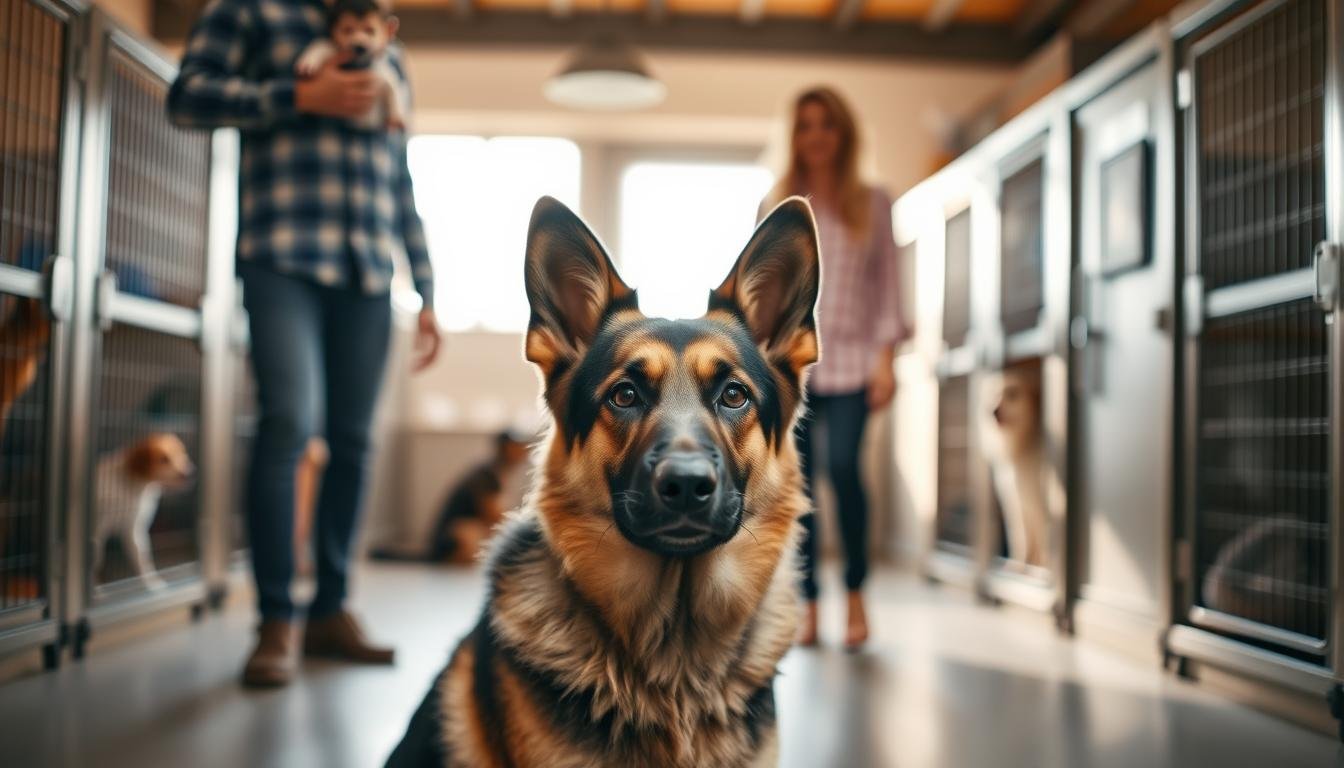The Best and Worst Times to Adopt a German Shepherd
Are you considering bringing a German Shepherd into your family, but unsure if now is the right time? This breed is known for its intelligence, loyalty, and high energy levels, making it a great companion for active families.
Before adopting, it’s crucial to assess your current life circumstances. You’ll need to consider factors such as your ability to provide regular exercise, training, and the significant time commitment required by this demanding breed.
Timing your adoption correctly can make a significant difference in both your experience and the dog’s wellbeing. Let’s explore the critical factors to consider before deciding if now is the right time to adopt a German Shepherd.
Key Takeaways
- Understand the unique temperament and needs of German Shepherds
- Learn about the high exercise and training requirements for this breed
- Discover how German Shepherds form strong bonds with their families
- Identify the ideal times to adopt a German Shepherd
- Recognize situations when you should consider postponing adoption
Understanding German Shepherd Characteristics
If you’re considering bringing a German Shepherd into your family, understanding its characteristics is essential. The German Shepherd Dog (GSD) is a breed that stands out for its intelligence, loyalty, and protective nature.
Breed Temperament and Personality
The GSD is known for being watchful and wary of strangers until they are sure that their owner is at ease. This breed is also great with children and will guard the family and their home with their life if necessary. Their loyalty and protective instincts make them excellent family dogs, but they require proper socialization to ensure they become well-adjusted family members.

Exercise and Training Requirements
German Shepherds need a lot of exercise, training, and socialization around other dogs and people. As an owner, you must be prepared to spend considerable time and money on these activities. They require both physical activity and mental stimulation daily to prevent behavioral problems. Their intelligence and need for consistent leadership make training a crucial aspect of their care.
Grooming and Maintenance Needs
The GSD is one of the worst breeds for shedding and loses hair almost constantly. They experience “blowing coat” periods twice a year, where they lose their undercoat within a couple of weeks. Regular grooming sessions, ideally 2-3 times a week, are necessary to keep their coat under control and maintain their overall health.
By understanding these characteristics, you can better assess whether your lifestyle can accommodate the needs of a German Shepherd, ensuring a happy and healthy relationship between you and your dog.
The Best and Worst Times to Adopt a German Shepherd
Adopting a German Shepherd is a significant decision that requires careful consideration of your lifestyle and circumstances. To ensure a successful adoption, it’s crucial to evaluate your current situation and determine if it’s the right time to bring a new dog into your life.
Ideal Life Circumstances for Adoption
Before adopting a German Shepherd, consider whether your life circumstances are conducive to providing the necessary care and attention. This includes having a stable home environment, sufficient time for training, and the financial resources to support your dog’s needs.
When You Have Sufficient Time for Training
Having sufficient time for training is crucial during the first year with your GSD. This period establishes the foundation for your relationship and the dog’s behavior. A well-trained dog is a joy to be around, and it’s essential to dedicate time to training sessions and socialization.
When Your Home Environment is Stable
A stable home environment is vital for a German Shepherd to feel secure and establish routines. If you have a busy or unpredictable lifestyle, it may not be the best time to adopt a dog. Consider whether your household is calm and stable enough to provide a nurturing environment for your new pet.
When You’re Financially Prepared
Owning a dog can be costly, and it’s essential to be financially prepared. The cost of quality dog food alone can range from $60 to over $100 per month, depending on the dog’s activity level. Additionally, you need to budget for regular veterinary care, training classes, and unexpected medical expenses. Ensure you have the financial resources to provide for your dog’s needs throughout its life.
Life Stages to Consider
When adopting a German Shepherd, it’s essential to consider the life stage that best suits your lifestyle and experience level. This includes deciding between a puppy and an adult dog, as well as considering seasonal factors that may impact your decision.
Puppies vs. Adult Dogs
Both puppies and adult dogs have their advantages and challenges. Puppies require more time and effort for training, while adult dogs may already have established behaviors. Consider your lifestyle and whether you’re better suited to raising a puppy or integrating an adult dog into your family.
Seasonal Considerations
Seasonal factors can also influence your adoption timing. For example, if you’re adopting a puppy, you may want to consider the challenges of housetraining during winter months or acclimating a new dog during extreme weather conditions. Plan accordingly to ensure a smooth transition for both you and your new dog.
By carefully evaluating your life circumstances and considering the needs of a German Shepherd, you can make an informed decision about the best time to adopt.  Ensuring that you’re prepared to provide a stable and loving home will result in a successful adoption experience for both you and your new companion.
Ensuring that you’re prepared to provide a stable and loving home will result in a successful adoption experience for both you and your new companion.
- A stable home environment is crucial for a German Shepherd to feel secure.
- Sufficient time for training is essential during the first year.
- Financial preparation is necessary to support your dog’s needs.
- Consider the life stage that best suits your lifestyle and experience level.
Situations When You Should Delay Adoption
If you’re considering adopting a German Shepherd, it’s essential to evaluate your current circumstances to ensure they align with the needs of this breed. Certain situations may not be conducive to providing the care and environment a German Shepherd requires.
Lifestyle Incompatibilities
Your lifestyle plays a significant role in determining whether a German Shepherd is the right pet for you. Frequent travel or long work hours can leave a German Shepherd alone for extended periods, potentially leading to separation anxiety and destructive behaviors. German Shepherds are pack animals that thrive on interaction and inclusion in family activities.
Frequent Travel or Long Work Hours
If you have a demanding job or travel frequently, it may not be the best time to adopt a German Shepherd. These dogs need consistent training, exercise, and attention. Without it, they can become unsocialized and develop behavioral issues.
Limited Physical Space or Activity Options
Living in a small apartment or having limited access to outdoor spaces can be challenging for a German Shepherd, as they require regular exercise to stay healthy and happy. If your living situation doesn’t allow for adequate physical activity, you might want to reconsider adopting a GSD.
Personal Readiness Factors
Your personal readiness is another crucial factor to consider. German Shepherds require leadership and training from their owners. If you’re not prepared to invest time in training or lack the confidence to establish clear boundaries, it might not be the right time for you to adopt.
Leadership and Training Capability
A German Shepherd needs an owner who can provide firm, consistent leadership. If you’re very easy-going or mild-mannered, you might find it difficult to provide the necessary guidance, potentially leading to a dominant or overprotective dog.
Financial and Time Constraints
Adopting a German Shepherd is not just a financial commitment for the initial adoption; it’s also a long-term investment in their care, including quality food, veterinary care, and training. Ensure you have the financial and time resources to provide for a GSD’s needs.
Family Considerations
The dynamics of your household are vital when considering adopting a German Shepherd. It’s crucial that your entire family is enthusiastic about adopting a GSD and is prepared to help with their care.
Household Consensus
A German Shepherd forms bonds with all household members. If there’s disagreement or tension about adopting a dog, it can affect the dog’s integration into the family.
Young Children and Other Pets
If you have young children or other pets, it’s essential to consider how a German Shepherd will fit into your household. Proper training and supervision are necessary to ensure safe interactions between a GSD and other family members, including children and pets.
By carefully evaluating these factors, you can make an informed decision about whether adopting a German Shepherd is right for you and your family.
Conclusion: Making the Right Decision
With thousands of animals in shelters, the timing of adopting a German Shepherd is crucial, not just for you, but for the welfare of the dog. To make an informed decision, you must consider several key factors, including your lifestyle, the level of care you can provide, and your ability to commit to a 10-14 year relationship with your pet.
It’s essential to be honest about your readiness to meet the needs of a German Shepherd, including training, exercise, and health care. Responsible ownership means being prepared for the challenges and joys that come with dog ownership. If you’re not ready, consider volunteering with rescue organizations or preparing your home for future adoption.
By waiting until you’re truly ready, you’ll not only ensure a happy home for your German Shepherd but also prevent the heartbreak of failed adoptions. Your decision to adopt should be guided by a commitment to providing a stable and loving family environment for your dog.

